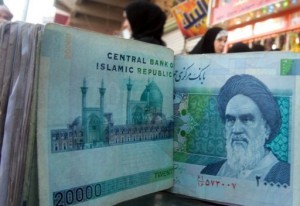 Iran�s cash-strapped government is looking to slash monthly handouts given to almost all Iranians in a move that could provoke popular anger as the country struggles with high inflation and unemployment.
Iran�s cash-strapped government is looking to slash monthly handouts given to almost all Iranians in a move that could provoke popular anger as the country struggles with high inflation and unemployment.When the government of Hassan Rouhani, the president, took office in August he promised to ease�economic hardship. But a priority, officials say, is to reduce the deficit � unofficially estimated to be as high as $28bn � caused by the policies of the previous government and international sanctions over the nuclear programme.
To do this, officials are rethinking the�payment mechanism�by which 76m Iranians have been receiving cash each month over the past three years to help with the cost of energy and basic commodities.
Valiollah Seif, Iran�s central bank governor, said at the weekend that the parliament and the government agreed to reform the payment scheme by the end of the current Iranian year (March 20, 2014). �The Iranian nation appreciates the [necessity] of such decision and the social ground is being paved for it,� he said.
Officials have raised the possibility of excluding better off Iranians � possibly about one-third of the population � from the scheme, but this runs the risk of stoking social unrest.
The previous government of Mahmoud Ahmadi-Nejad began cutting subsidies on energy and other basic commodities in December 2010 in an effort to curb wasteful consumption and save money in a move praised by the International Monetary Fund.
To compensate for the resulting price rises, Iran�s parliament obliged the government to give half the money saved from the subsidy cuts back to the poor in the form of monthly cash payments. The rest of the income was to be used to support domestic industry.
Instead, Mr Ahmadi-Nejad widened the payment scheme to include almost all Iranians, absorbing all the money generated by the subsidy cuts � and later even more.�Domestic industry bore the brunt�of the policy with a steep rise in energy costs that crippled its ability to compete with cheap imports.
The move, which was criticised by many Iranian economists, also fuelled inflation, which is about 40 per cent. With the fall in the rial by almost 50 per cent since last year because of sanctions, the value of the payment has plummeted from $45 to $18, creating demand for it to be increased.
Majid Ansari, deputy president for parliamentary affairs, said the government saves 280tn rials ($11.2bn) annually from the cut in subsidies, but this is dwarfed by the 400tn rials ($16.1bn) it pays out in cash.
�The gap?.?.?.?is so [huge] that it makes continuation of the current payments impossible,� he said, adding that the government and the parliament had to work out a way to stop handouts to so many people.
The government argues that there are two ways to do this: reduce the number of recipients of cash handouts or increase energy prices to fund the current mechanism.
Although both options are deeply unpopular, the latter could be even more damaging to the new government. Not only are people already complaining that their energy bills are too high but many of the unemployed have become taxi drivers and rely on cheap fuel to make ends meet.
The ministries of energy and oil, which are responsible for covering the difference between the savings on subsidies and the cash payouts, say they are no longer able to do so.
Bijan Namdar-Zanganeh, oil minister, warned�on Saturday�that the current compensation system was acting like �a huge giant [sitting] on the throat and chest� of the energy sector pushing it toward �complete destruction�.
By The Financial Times
The Iran Project is not responsible for the content of quoted articles.










